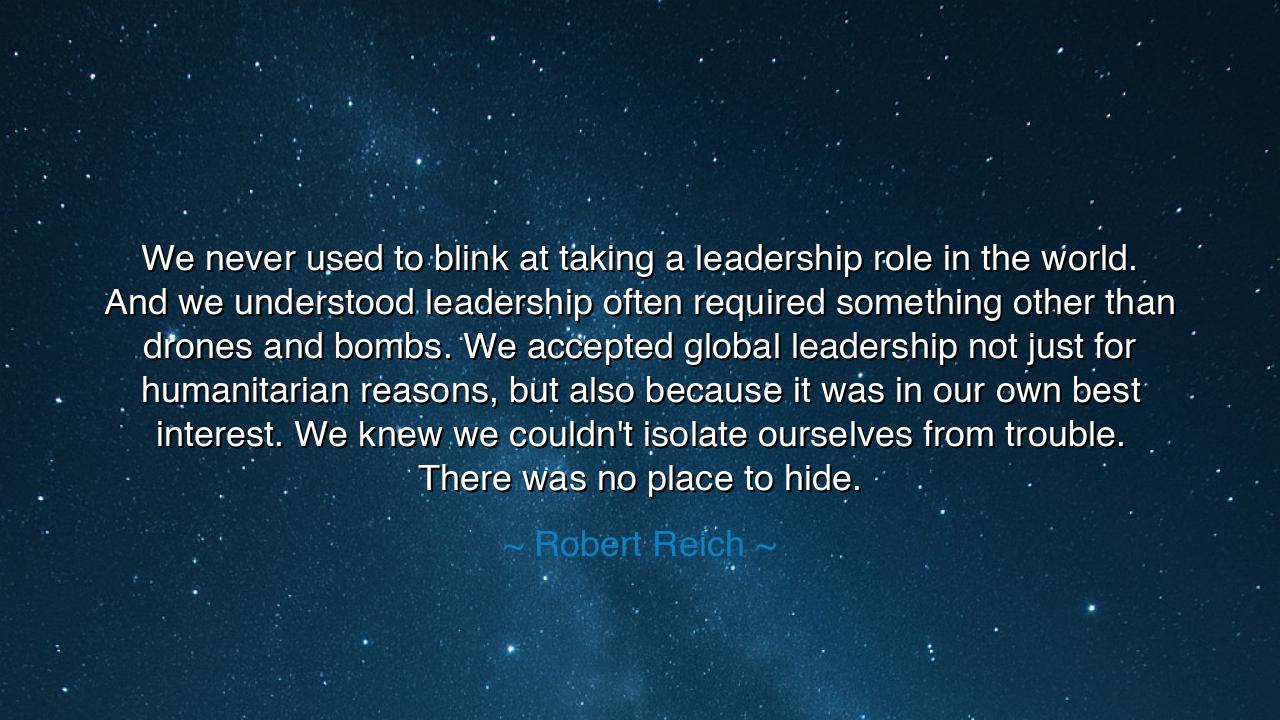
We never used to blink at taking a leadership role in the world.
We never used to blink at taking a leadership role in the world. And we understood leadership often required something other than drones and bombs. We accepted global leadership not just for humanitarian reasons, but also because it was in our own best interest. We knew we couldn't isolate ourselves from trouble. There was no place to hide.






“We never used to blink at taking a leadership role in the world. And we understood leadership often required something other than drones and bombs. We accepted global leadership not just for humanitarian reasons, but also because it was in our own best interest. We knew we couldn't isolate ourselves from trouble. There was no place to hide.” — Robert Reich
In these words, Robert Reich, the scholar and former U.S. Secretary of Labor, speaks not only of nations, but of the very soul of leadership itself. His voice carries the weight of remembrance — the memory of a time when America, and indeed humanity, saw leadership not as domination but as responsibility. In his quote, Reich laments the shrinking of moral courage, the retreat of vision, and the rise of fear in a world that once understood that true strength is found not in weapons, but in wisdom; not in isolation, but in engagement. It is a call to rediscover what it means to lead — with compassion, with foresight, and with the understanding that to lead is to serve.
The origin of this quote lies in Reich’s reflections on the changing role of the United States in global affairs. As a man who lived through eras of both idealism and cynicism, he watched his nation drift from a spirit of collective stewardship toward one of guarded self-interest. He remembered the postwar years, when the world lay shattered and America, rather than turning inward, extended its hand. Through the Marshall Plan, through alliances and diplomacy, it helped rebuild nations not to control them, but to create stability and shared prosperity. That was leadership — costly, imperfect, but visionary. Reich’s words are born from the contrast between that era and a newer one, where leadership too often hides behind drones, rhetoric, and walls.
The ancients, too, knew this truth. The philosopher Plutarch, in his writings on kings and generals, taught that power without virtue is corruption, and that the leader who rules by fear destroys his own strength. Reich’s statement revives that ancient lesson: that leadership is not conquest, but connection. A great civilization must see itself not as fortress but as bridge — for the world’s troubles, like the sea, cannot be shut out by stone. In an age of interwoven destinies, to ignore suffering beyond our borders is to invite it to our own door.
Consider the story of George Marshall, the general who became a peacemaker. After World War II, when much of Europe lay in ruin, he proposed a bold plan not to punish enemies, but to restore them. The Marshall Plan poured billions into rebuilding Europe — not out of charity, but out of wisdom. Marshall and his peers knew that a hungry world breeds chaos, and that a stable world secures peace. They saw leadership as an act of creation, not destruction. And through their vision, a devastated continent was reborn. This is the spirit Reich invokes — the belief that global leadership, when guided by conscience and self-awareness, serves not only the world, but the very nation that practices it.
Yet Reich’s words also carry warning. “There was no place to hide,” he says — and this truth is as eternal as it is urgent. In the modern age, no nation can isolate itself from the world’s pain. A pandemic crosses borders faster than armies. Climate change respects no wall. Economic collapse in one region ripples across oceans. Isolation, once a refuge, has become an illusion. The wise leader — whether of a household, a company, or a nation — knows that to turn away from the world’s troubles is to invite them home.
In this, Reich’s wisdom is both political and philosophical. He reminds us that leadership without empathy is tyranny, and security without solidarity is an illusion. To lead is to understand that strength comes not from domination, but from cooperation; not from pride, but from partnership. The ancient kings who sought to rule through fear left behind ruins and ghosts; those who ruled through justice left behind civilizations. So it is now: the choice before every generation is not whether to lead, but how to lead — with fists, or with open hands.
Let this be the lesson drawn from Reich’s words: leadership is not a crown, but a calling. It demands courage not of the sword, but of the heart — the courage to engage when retreat feels safer, to act when silence feels easy. Whether you lead a nation or a single life, understand this: we are all bound together, and no one can truly flourish while others are in ruin. The troubles of the world will find us, whether we seek them or not; better, then, to meet them as builders rather than bystanders.
So, O listener, take this teaching to heart: do not hide from the world. Lead, not with arrogance, but with empathy. Seek not the shelter of isolation, but the strength of connection. For the destiny of the world, as Reich reminds us, is shared — and in that shared destiny lies both our peril and our salvation. And when we choose to lead with conscience and courage, we find that there is indeed no place to hide — but also, at last, no need to.






AAdministratorAdministrator
Welcome, honored guests. Please leave a comment, we will respond soon